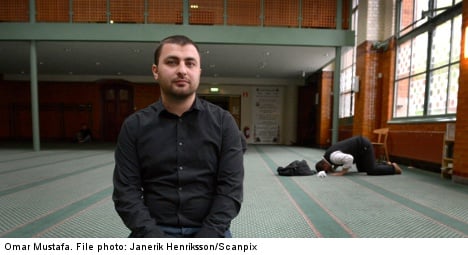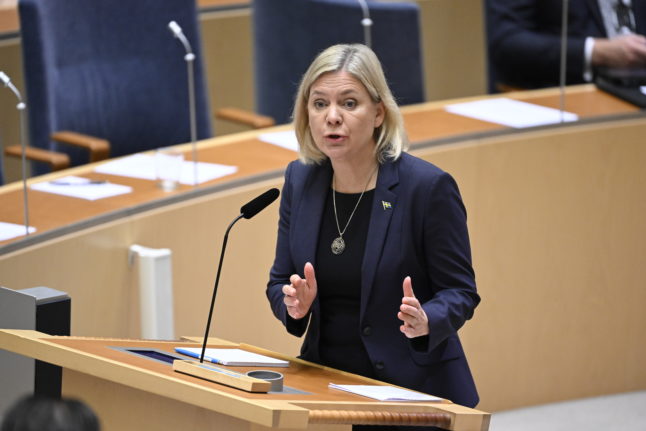So, who exactly is this person?
Omar Mustafa has served as chairman of Sweden’s Islamic Association (Islamiska förbundet) since December 4th 2010 and was elected as a substitute member of the governing board of the Social Democratic party on April 7th 2013.
Mustafa served as a board member of the party’s local district in Stockholm (Arbetarekommun) after his election in 2012.
Why has he been in all the papers for the past fortnight?
His election was met with criticism by senior party members, including current and former leaders Stefan Löfven and Mona Sahlin, and he stepped down from all positions of responsibility within the party six days later.
Why was his election criticized?
Anti-racist magazine Expo published an article on April 8th reporting that Omar Mustafa had been criticized for “not having distanced himself from anti-Semites”.
The article cited Willy Silberstein from the Swedish Committee Against Antisemitism, (SCAA), who accused Mustafa of having given legitimacy to Egyptians Sallah Sultan and Ragheb Al-Serjany by inviting them to speak at an event organized by the Swedish Islamic Association in 2010.
He was also criticized by Silberstein for having said in a debate on Sveriges Radio in 2010 that Mustafa Yousef Al-Qaradawi was “often very balanced in his rhetoric”.
The debate has also been extended to criticism of the appearance of Yasir Qadhi, Azzam Tamimi and Yvonne Ridley at the association’s “family days” in Stockholm in March 2013.
Criticism of these speakers centres around the issues of anti-Semitism, homophobia and support for terrorism, and for Hamas.
What was Omar Mustafa’s response to the criticism?
In an article published in the Aftonbladet daily on April 11th, Mustafa was conciliatory and expressed understanding for the criticism.
“I fully understand the view of critics that the participation of these people can be construed as legitimizing a hate-filled and intolerant view,” he wrote.
He declared that the Islamic Association “needs to be better” at ensuring that speakers have distanced themselves from previous hate-filled rhetoric before inviting them to Sweden.
He underlined that he stands behind the Swedish marriage law, “which among other things gives homosexuals the right to marry”. He also stated that he sees “women’s rights as human rights” and underlined his belief in “a society which is characterized by diversity and equality”.
However, when the Islamic Association was first criticized of connections to anti-Semitism in 2011, Mustafa adopted a distinctly different tone, dismissing accusations as Islamophobia.
Mustafa insisted at the time that the association would “continue to invite known and relevant Muslim speakers” to its events “regardless of what… the Islamophobes say and think”.
So what happened next?
Criticism of Omar Mustafa and the Islamic Association continued in the media throughout the week. Mona Sahlin, among others, accused Mustafa personally of anti-Semitism although she has since distanced herself from the comments.
He has also been accused of making homophobic statements.
The Svenska Dagbladet daily reported on April 20th that it had searched the Swedish press archive and Omar Mustafa’s social media activity over the past three years and found nothing of an anti-Semitic or homophobic nature.
Mustafa was however found by the Aftonbladet daily to have argued against the party line when using his Twitter account in March 2011 to call for fighter aircraft to be sent to attack Israel.
The Svenska Dagbladet report also discounted a claim, originally made by Social Democrat Vivianne Macdisi, that the Islamic Association’s bylaws (see link below) stipulated a distinction between the status of women and men.
The document in question was on the website until recently but was buried in an archive of translated documents and was not part of the association’s bylaws.
On Saturday April 13th Social Democrat party leader Stefan Löfven issued an ultimatum to Omar Mustafa saying that he had to share the party’s values in response to a question as to whether Mustafa could remain as chair of the Islamic Association and sit on the party’s executive board.
Later on Saturday Omar Mustafa resigned from all posts within the party after discussions with the party’s head in Stockholm, Veronica Palm.
So that was the end of that?
No. The story remains in the news following statements by Omar Mustafa criticizing the party and accusing his critics of Islamophobia.
He has received support from representatives of Social Democratic faith groups, such as Peter Weiderud and Ulf Bjereld, and further criticism from senior party veterans such as Nalin Pekgul.
In an analysis posted on his blog on April 18th, political scientist Andreas Johansson Heinö argued that “the Mustafa-affair is here to stay” explaining that the issue has left divisions in the party, the media and other sections of society.
“We are now in a situation where the party is deeply split on something as fundamental as Islamism. Are Omar Mustafa and the Islamic Association Islamist or not? Is this consistent with Social Democracy or not?”
“That a party the size of the Social Democrats is caught out by these questions is completely astounding,” Johansson Heinö concluded.
Peter Vinthagen Simpson



 Please whitelist us to continue reading.
Please whitelist us to continue reading.
Member comments